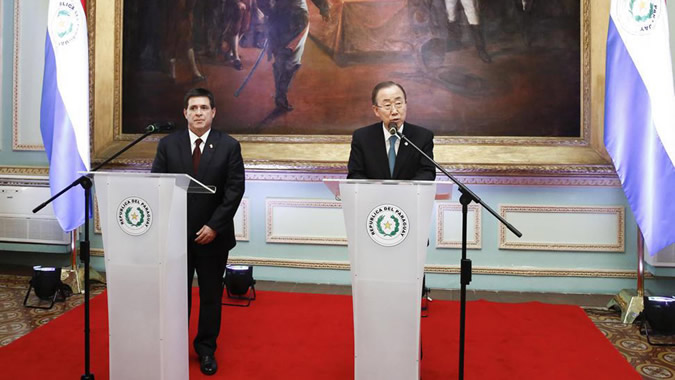In Paraguay, UN Chief Sets Sights on Post-2015 Development Agenda
Secretary-General Ban Ki-moon met with President Horacio Cartes Jara at the Government Palace.

Secretary-General Ban Ki-moon has called on the Government of Paraguay to join forces with the United Nations and forge ahead in framing the post-2015 agenda for a new generation of sustainable development goals, noting that the country had “an important role to play across the board.”
“We need sustainable and inclusive development for all,” Mr. Ban declared today during a joint press briefing with Paraguay’s President Horacio Manuel Cartes Jara in the country’s capital of Asunción. “At this decisive moment, we must work together to end poverty and transform lives while protecting the planet.”
This year marks the end of implementation of the landmark UN Millennium Development Goals (MDGs), which world leaders agreed on 15 years ago in an effort to tackle poverty and climate change and to pave the way towards a more gender equal global society. The new targets, to be known as the sustainable development goals (SDGs), are defining the way forward on the world’s most pressing issues until the next critical deadline in 2030.
Overall, there has been significant progress in meeting the MDG targets. Global poverty has been halved well ahead of the 2015 deadline; in developing countries, 90 per cent of children now enjoy primary education; the number of people lacking access to improved drinking water has halved; and the fight against malaria and tuberculosis has shown results.
Nonetheless, numerous challenges persist. Globally, 73 million young people are looking for work and many more are trapped in exploitative jobs. In recent years, more than two and a half million more children in affluent countries fell into poverty, bringing the total above 76 million.
In Asunción, Mr. Ban “warmly congratulated” Mr. Cartes on Paraguay’s “impressive achievements” in reducing poverty and striving to meet the MDGs. More Paraguayans are currently enjoying better access to education and health care, he observed, and an increasing number of families are gaining access to clean water and sanitation.
At the same time, the country was experiencing the damaging effects of global warming despite not being a large contributor to global emissions.
“Paraguay is already feeling the impacts of climate change – ranging from increased flooding to prolonged droughts,” Mr. Ban continued. He added that at the Paris climate conference in December the world would have “the chance to adopt a meaningful, universal agreement to tackle climate change.”
The Secretary-General, who travels tomorrow to Paraguay’s famed ITAIPU hydroelectric dam, also celebrated the South American country for its ongoing contributions to the UN – from the Paraguayan peacekeepers serving in eight countries around the world to the country’s “leadership in advancing the special needs of Landlocked Developing Countries.”
Author
Country(ies)
-
Paraguay
Contact
Public Information Unit
- prensa@cepal.org
- (56 2) 2210 2040